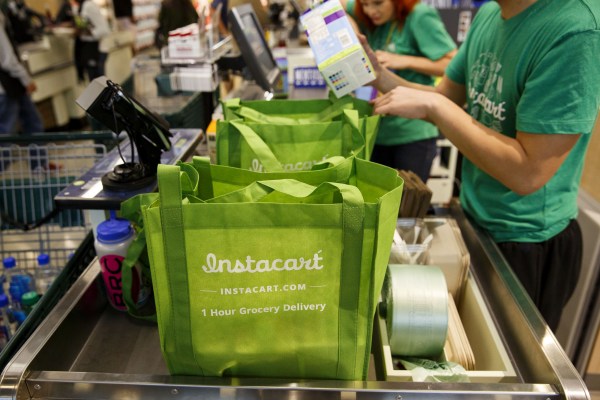Instacart announced today that it has raised $200 million in a new funding round featuring prior investors. D1 Capital and Valiant Peregrine Fund led the investment. Instacart is now worth $17.7 billion, post-money, or $17.5 billion pre-money. The plan is to use the funding to focus on introducing new features and tools to improve the customer experience, and further support Instacart’s enterprise and ads businesses, according to a blog post.
Previously in 2020, Instacart raised $100 million in July, and $225 million in June. The June round valued the company at around $13.7 billion, meaning that the unicorn’s new funding round — raised just months later — came at a much higher price.
Instacart, like some other tech, and tech-enabled businesses, has seen demand for its service expand during the pandemic. It’s not hard to trace a connection between COVID-19 and its business results, as folks wanting to stay at home have turned to on-demand services to keep themselves safe.
The growth shown by Uber’s food delivery business is another example of this trend.
Instacart’s valuation has more than doubled since its 2018 Series F, when it was worth around $7.9 billion. The pace at which Instacart has created paper value is impressive, though its IPO plans appear murky from the outside and how much of its COVID-bump will be retained when the pandemic ends is not yet clear.
The startup famously turned a profit during a month in Q2, worth around $10 million per The Information. The same report indicated that Instacart lost around $300 million in 2019. What the company’s full-year profitability profile will look like is not known.
TechCrunch sent a number of questions to the firm, including if it has had any further profitable months in 2020, and how quickly it grew in Q3 2020. The company’s spokespeople did not answer those questions.
“Today’s investment is a testament to the strong conviction our existing investors have in the strength of our teams and the important role Instacart plays for customers, partners, and the entire grocery ecosystem,” Instacart CEO Apoorva Mehta said in a press release. “I’m incredibly proud of our team’s work to scale our business this past year and rise to meet the unprecedented consumer demand and growth.”
Instacart is one of the company’s caught up in a regulatory war after California passed AB5, which changed the state’s rules on gig workers. A voter proposition — Prop 22 — that would keep rideshare drivers and delivery workers classified as independent contractors, is coming up for a vote in California. Instacart is in favor of the proposition, along with Uber, Lyft, DoorDash and Postmates (now owned by Uber).
Uber, Lyft, Instacart and DoorDash have collectively contributed $184,008,361.46 to the Yes on 22 campaign. Those contributions have been monetary, non-monetary and have come in the form of loans. In September, the four companies each committed another $17.5 million to Yes on Prop 22 in monetary contributions. Of all the measures on this November’s ballot, Yes on Prop 22 has received the most contributions, according to California’s Fair Political Practices Commission.
Beyond Prop 22, Instacart is facing a lawsuit from Washington, D.C. District Attorney General Karl A. Racine that alleges the company charged customers millions of dollars in “deceptive service fees” and failed to pay hundreds of thousands of dollars’ worth of sales tax. The suit seeks restitution for customers who paid those service fees, as well as back taxes and interest on taxes owed to D.C. Specifically, it alleges Instacart misled customers regarding the 10% service fee to think it was a tip for the delivery person, from September 2016 to April 2018.
Meanwhile, amid the pandemic and wildfires in California, workers have demanded personal protective equipment and better pay, and, most recently, disaster relief.
